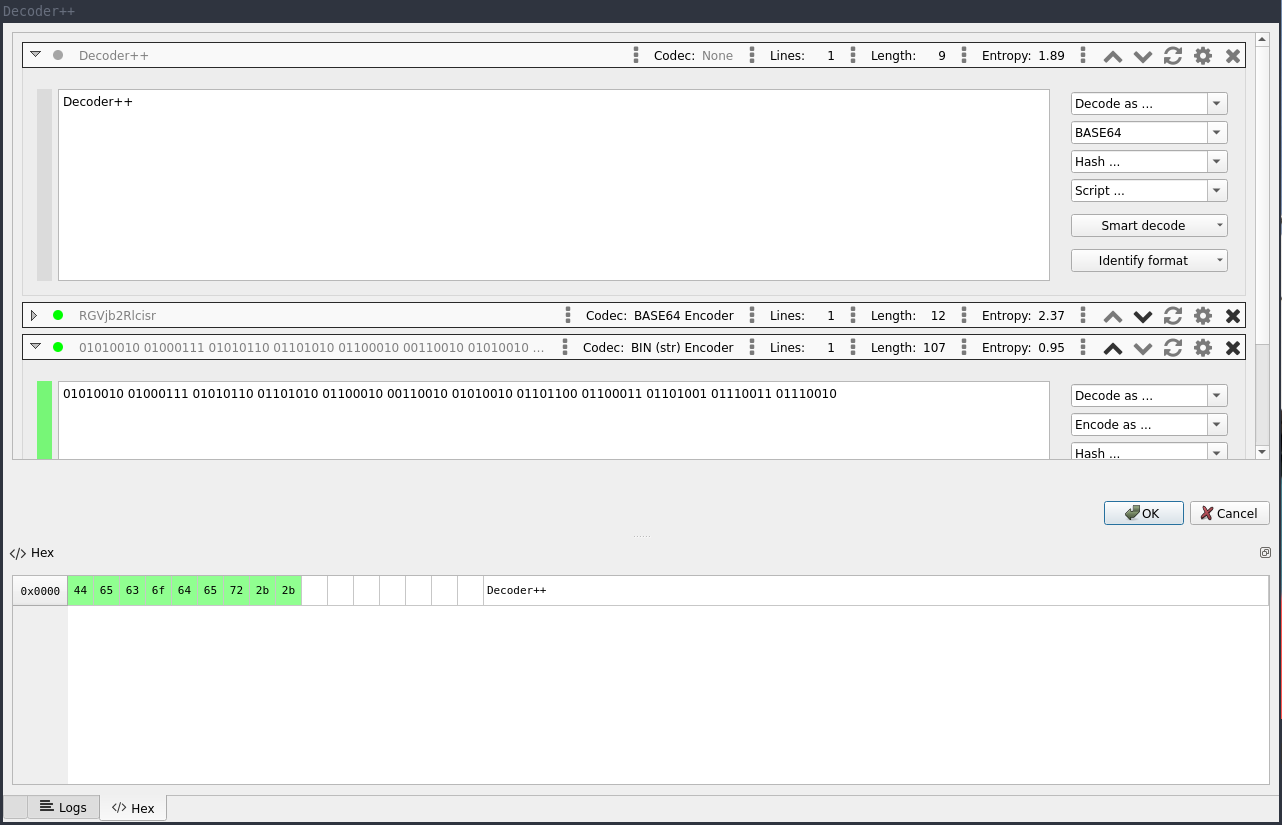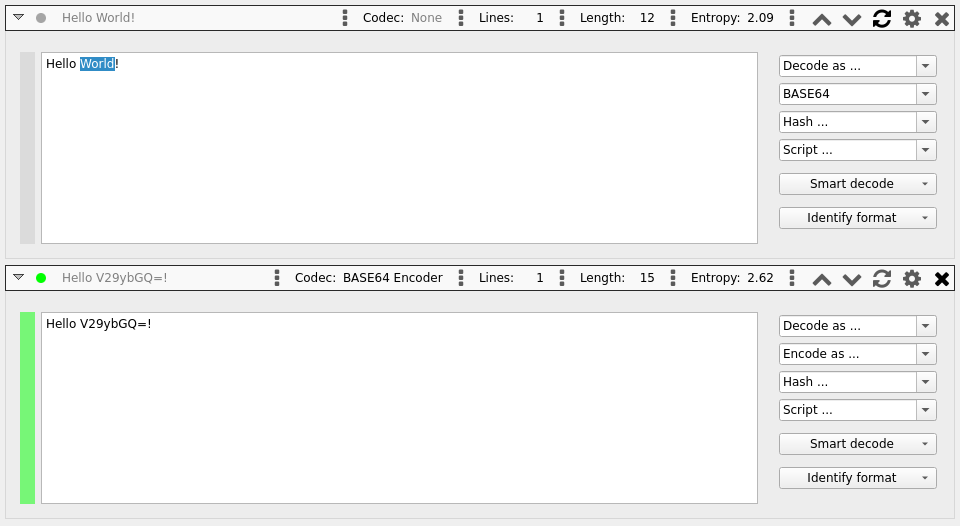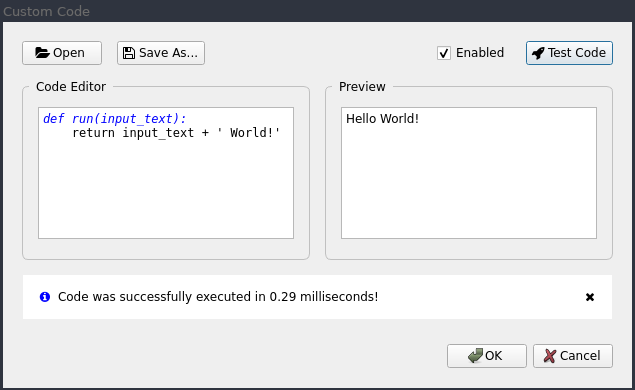Decoder++ is an extensible application designed for penetration testers, software developers, and anyone in between looking to effortlessly decode and encode data across various formats. It includes a wide range of preinstalled scripts and codecs, smart decoding and format identification, and supports both graphical user interface (GUI) and command-line interface (CLI) operations.
Get up and running with Decoder++ in just a few steps:
# Install using pip (latest:qt6)
pip3 install decoder-plus-plus[qt6]
# Or, for a qt5 backport:
pip3 install decoder-plus-plus[qt5]
# To leverage all features and plugins:
pip3 install decoder-plus-plus[extras]For a detailed installation guide, including platform-specific instructions, see the Installation Guide.
This section provides an overview about the individual ways of interacting with
Decoder++. For additional usage information check out the Advanced Usage section.
The graphical user interface provides two distinct interaction modes:
a main-window-mode and a dialog-mode.
While the main-window-mode supports tabbing, the dialog-mode has the ability to return the transformed
content to stdout ready for further processing.
As a result Decoder++ can enhance other tools/scripts
by providing a graphical user interface for flexible transformation of any input.
While Decoder++ processes the entire input text by default, it allows for selective data transformation as well.
To transform only a specific portion of your text, simply highlight the necessary text segment in the input field
and then apply the desired codec.
In addition to the graphical user interface Decoder++ also provides a command line interface:
$ dpp -e base64 -h sha1 "Hello, world!"
e52d74c6d046c390345ae4343406b99587f2af0dDecoder++ allows you to choose from a variety of codecs and scripts:
- Encode/Decode:
- Base16, Base32, Base45, Base64, Base64 (URL-safe)
- Binary, Gzip, Hex, Html, JWT, HTTP64
- Octal, Url, Url+, Zlib
- Hashing:
- Adler-32, Apache-Md5, CRC32, FreeBSD-NT
- Keccak224, Keccak256, Keccak384, Keccak512
- LM, Md2, Md4, Md5, NT, PHPass
- RipeMd160, Sha1, Sha3 224, Sha3 256, Sha3 384, Sha3 512
- Sha224, Sha256, Sha348, Sha512, Sun Md5
- Scripts:
- Caesar, CSS-Minify, Custom Code, Extract URLs, Filter-Lines
- Identify File Format, Identify Hash Format, JS-Beautifier, JS-to-XML, JQ
- JSONify, JSONPath, HTML-Beautifier
- Little/Big-Endian Transform, Reformat Text, Remove Newlines, Remove Whitespaces
- Search and Replace, Split and Rejoin, Unescape/Escape String, XPath
In cases where you require a bit more flexibility Decoder++ allows you to process your data with
custom scripts by using the Custom Code script:
This section provides additional information about how the command line interface can be used.
The commandline interface gives easy access to all available codecs.
To list them the -l argument can be used. To narrow down the search
the -l argument accepts additional parameters which work as filter:
$ dpp -l base enc
Codec Type
----- ----
base16 encoder
base32 encoder
base64 encoder
Decoder++ distinguishes between encoders, decoders, hashers and scripts.
Like the graphical user interface the command line interface allows the usage of multiple codecs in a row:
$ dpp "H4sIAAXmeVsC//NIzcnJ11Eozy/KSVEEAObG5usNAAAA" -d base64 -d gzip
Hello, world!While encoders, decoders and hashers can be used right away, some scripts may require additional configuration.
To show all available options of a specific script add the help parameter:
$ dpp "Hello, world!" -s split_and_rejoin help
Split & Rejoin
==============
Name Value Group Required Description
---- ----- ----- -------- -----------
split_by_chars split_behaviour yes the chars used at which to split the text
split_by_length 0 split_behaviour yes the length used at which to split the text
rejoin_with_chars yes the chars used to join the splitted text
To configure a specific script the individual options need to be supplied as name-value pairs (e.g. search_term="Hello"):
$ dpp "Hello, world!" -s search_and_replace search_term="Hello" replace_term="Hey"
Hey, world!
Feel free to open a new ticket for requesting features or reporting bugs. Also don't hesitate to issue a pull-request for new features/plugins. More information regarding Decoder++ development can be found in the Development Guide.
Thanks to
- Tim Menapace (RIPEMD160, KECCAK256)
- Robin Krumnow (ROT13)
When starting Decoder++ in Mac OS signals are not working.
This might happen when PyQt6 is installed using homebrew.
When starting Decoder++ in CygWin an error occurs:
ModuleNotFoundError: No module named 'PyQt6'
This might happen even if PyQt6 is installed using pip.
Currently there is no fix for that. Instead it is recommended
to start Decoder++ using the Windows command line.
When starting Decoder++ the error No module named 'PyQt6.sig' is displayed on the console.
This may happen when there are competing versions of PyQt6 installed. Reinstalling PyQt6 should fix this error.
$ sudo pip3 uninstall PyQt6
$ sudo pip3 install PyQt6
At least in Ubuntu 22.04 it might be necessary to install the following packages using apt:
apt install libqt6core6 libqt6network6 libqt6openglwidgets6 libqt6widgets6
In order to run dpp inside a container/virtual machine you may need to install the
qt6-qpa-plugins inside the container/virtual machine and configure the
QT_QPA_PLATFORM_PLUGIN_PATH accordingly:
apt install qt6-qpa-plugins
export QT_QPA_PLATFORM_PLUGIN_PATH=/usr/lib/x86_64-linux-gnu/qt6/plugins/platforms/
See the Docker build and run scripts for more information regarding how to build and run a Decoder++ Docker container.
- PortSwigger's Burp Decoder
- QtPy / PyQt5 / PyQt6
- QtAwesome







